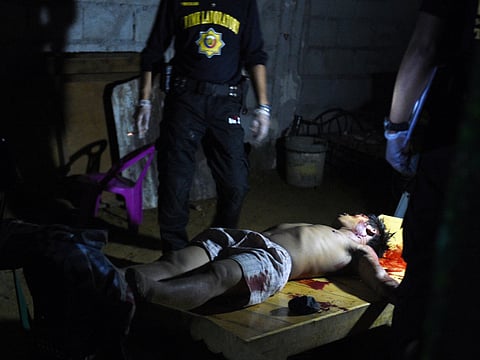Duterte’s war on drugs draws fire
Philippine president’s controversial campaign under scrutiny

The war on drugs declared by Philippines President Rodrigo Duterte came under scrutiny last week with the publication of an undercover investigation by the New York Times.
“President Rodrigo Duterte of the Philippines relishes his image as a defiant crusader, willing to encourage the slaughter of thousands in the name of saving his nation from the scourge of drugs,” said the newspaper in an editorial that followed the investigative expose. “More than 7,000 suspected drug users and dealers, witnesses and bystanders — including children — have been killed by the police or vigilantes in the Philippines since last July. The man is impervious to moral criticism, but he may not be immune forever from legal action. Last Thursday, the Philippine lawmaker Gary Alejano filed an impeachment complaint against Mr Duterte, accusing him of corruption, murder and crimes against humanity in connection with his bloody antidrug campaign,” the paper said.
Observing that it was unlikely Duterte would continue to maintain an obliging attitude toward prosecution, it said: “A more consequential action could be one threatened by the European Union. Outraged by Mr Duterte’s behaviour, as well as his government’s possible reinstatement of the death penalty and lowering the age for criminal prosecution to nine, the EU has proposed hitting his government where it may hurt the most — by imposing tariffs on Philippine goods. Other democratic trading partners should do the same.”
The Philippines Daily Inquirer, meanwhile, sought to highlight Duterte as a statesman and its significance in gauging his policies. “In the wake of the national and international controversy over his so-called war on illegal drugs, it must have been a welcome opportunity for the leaders of Myanmar and Thailand to sit down with Mr Duterte for candid, closed-door discussions. While many opportunities exist during Asean and Asia Pacific Economic Cooperation summits for bilateral meetings on the side, there is nothing like an official visit, and uninterrupted time, for leaders to get to know one another better,” the paper said. “The visits are good for the Philippines because it allows the other leaders of Asean to gauge President Duterte up close, and because they show that the Philippines is fully committed to its responsibility as Asean chair this year, the 50th anniversary of the primary regional bloc.”
The impending divorce between the UK and Europe also prompted a flurry of editorials, including this one from the Observer: “Like sheep, the British people, regardless of whether they support Brexit, are being herded off a cliff, duped and misled by the most irresponsible, least trustworthy government in living memory... This week, on Black Wednesday, the UK will throw into jeopardy the achievements of 60 years of unparalleled European peace, security and prosperity from which it has greatly benefited. And for what?”
The unsparing editorial then went on to examine its impact and said: “The ultra-hard Tory Brexit break with Europe that is now seen as the most likely outcome when the two-year negotiation concludes is the peacetime equivalent of the ignominious retreat from Dunkirk. It is a national catastrophe by any measure. It is a historic error... It is a reckless, foolhardy leap into the unknown.”
The Globe and Mail in Canada meanwhile focused on the Irish question and said: “It’s all too familiar to Canadians: a separatist government that didn’t get the result it wanted in a first referendum comes back for another try, because of a ‘material change of circumstances’. That’s how Scotland’s First Minister, Nicola Sturgeon, put it when she announced that she will seek permission from the British Parliament to hold a second referendum on Scottish independence... This is crass political opportunism, and it will hurt Scotland by adding an extra layer of economic uncertainty to the one created by Brexit.”


